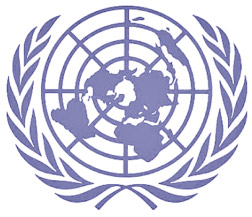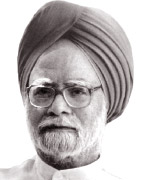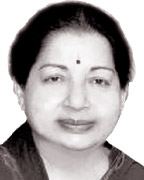|
Jammu and Kashmir now in the wings:
Indian opportunism in Geneva will rebound in global arena
  If there were any efforts by its diplomats in Geneva to show that
India has the strength to “water down” the US sponsored resolution
proposed at the current United Nations Human Rights Commission (UHRC)
sessions in Geneva, these were completely thwarted by what is taking
place back home in Tamil Nadu and New Delhi. If there were any efforts by its diplomats in Geneva to show that
India has the strength to “water down” the US sponsored resolution
proposed at the current United Nations Human Rights Commission (UHRC)
sessions in Geneva, these were completely thwarted by what is taking
place back home in Tamil Nadu and New Delhi.
The resolution against Sri Lanka has now been passed. It appears that
New Delhi will receive more battering from Tamil Nadu, with major
implications for India’s foreign policy. India will have to do much
worrying and praying about Jammu and Kashmir, in the months ahead.
The withdrawal of Karunanidhi’s DMK from the Congress-led PA
government in New Delhi, has made the Union Government of Manmohan Singh
so weak that a BJP member has described as the “lamest of lame ducks”.
Having presented a budget with the aim of winning the next general
election due next year, the UPA minus the DMK, now faces a situation of
possibly having to advance the election due to continuing instability
and also not have a chance to implement its populist policies presented
in a budget that lacks both political and economic sense and
sensibility.
Sri Lanka is facing the pain of extremism, and even terrorism, in
Tamil Nadu in the recent attacks carried out against its citizens and
institutions there for the past several months, the latest is the attack
on two Buddhist monks, one who is studying in another part of India and
the other a pilgrim. The statements by the Government of India that it
is taking all measures to ensure the safety of Sri Lankan nationals in
and visiting India are of little purpose in the context of what is
taking place in Tamil Nadu, with the main political rivals there
unleashing the worst extremism in pretended support for the Tamils of
Sri Lanka.
What is taking place there, apart from the stoking of anger against
Sri Lanka, by the promotion of widespread protest and violence against
Sri Lankan citizens and property, while Sri Lanka is the country with
the largest volume of trade with India, is the threat to Indian foreign
relations with the policy of the country being dictated by the interests
of internal regional politics rather than the wider national interests
of the country. The warnings about this are many, from Indians who have
been studying the current developments there.
 |
|
Manmohan
Singh |
The political rivalry between the DMK of Karunanidhi and the AIADMK
led by Tamil Nadu Chief Minister Jayalalithaa is targeted at the coming
general elections, with both trying to wield more power at the Centre.
The rivalry is sharper with the expectations among them of the next
Prime Minister of India being from Tamil Nadu, and the DMK’s support
going to Finance Minister P. Chidambaram of the Congress, against the
hopes of Jayalalithaa to get to the helm in New Delhi.
The danger of what this rivalry could do, when played out to
influence foreign policy, with demands to include “genocide” on the
US-sponsored resolution against Sri Lanka, and the call for foreign
investigation in Sri Lanka has been pointed out buy important sections
of the Indian media as well as scholars and key political analysts.
Incite passions
As the Pioneer states in its editorial “Short-sighted politics”
(March 20): DMK can’t dictate foreign policy -- “The DMK chief
Karunanidhi’s decision to pull out of the ruling UPA Government has been
motivated more by the desire to reclaim lost political ground in Tamil
Nadu than by the concern for the Tamils of Sri Lanka. Ever since the
party was ousted from power in the State by the Jayalalithaa led AIADMK,
Mr. Karunanidhi has been struggling to find an issue which could revive
his and his party’s fortunes, and he appears to have discovered that
outside his State, and indeed the country. He has been shedding copious
tears over the alleged marginalization of the Tamil population in Sri
Lanka after the Government there succeeded in eliminating terrorist V
Prabhakaran and decimating his Liberation Tigers of Tamil Eelam.
Claiming that he was standing firm with his Tamil brethren in the
island-nation in its hour of crisis, the DMK supremo has sought to
incite passions in the State and build for himself a vote-bank ahead of
the Lok Sabha election. He has been especially belligerent because he
has to contend with a similar, if less aggressive, stand by his
political rivals in the State.
“But in this game of one-upmanship, Mr. Karunanidhi must realize that
his aggression does no good to the Tamils in Sri Lanka. Had the DMK
leader been really serious in ensuring justice, he out to have persuaded
the Centre to negotiate with Colombo concrete ways and means to protect
the rights of the Tamil population and to empower them politically. He
should have asked Sri Lanka’s Tamil National Alliance -- which is a
conglomeration of various parties fighting for the Tamil cause – to join
the parliamentary select committee which is looking precisely into those
various grievances which the Tamils have raised.
 |
 |
| J.
Jayalalithaa |
M.
Karunanidhi |
By becoming part of the panel, the TNA could not only have given its
suggestions but also ensured that the Government there implemented them.
Mr. Karunanidhi could have persuaded the Manmohan Singh regime to push
Colombo into fast-tracking the recommendations of the LLRC, which was
appointed by President Mahinda Rajapaksa to go into various aspects of
the conflict and into the failure of the 2002 ceasefire agreement. The
LLRC report is a public document and Colombo has accepted it.
“But Mr. Karunanidhi didn’t do that because he would not have been
able to arouse the passions that he is whipping up now in Tamil Nadu by
citing some genuine but mostly perceived grievances. Instead he has
taken to grand-standing, marching his party out of the UPA regime, and
at the same time expressing his willingness to return if parliament
adopts a resolution condemning Colombo. He has also been demanding that
India back (or move) a strong resolution against Sri Lanka in the UNHRC
for “genocide”. That is ridiculous. Sri Lanka has been a friend and its
friendship is critical to our geo-political interests in the region.
There are better ways to persuade a friend than to humiliate it
before the world and lose strategic advantage. The country’s foreign
policy cannot be dictated by the DMK. It is now to be hoped that the UPA
regime does not capitulate and do something foolish to get its ally
back; like moving a resolution in Parliament that castigates Sri Lanka.”
(My emphasis)
Similarly Hindu in its editorial titled “Mindless Solidarity” (March
20) states, “the mindless violence of some of the fringe Tamil outfits
is putting at risk India’s own moral authority to urge Sri Lanka to move
towards a political settlement of the ethnic conflict.”
Fanatic fringe
As the Hindu states, “A fanatic fringe seems intent on hijacking the
protest movement in Tamil Nadu against Sri Lanka’s treatment of its
Tamil citizens. With the terrorist Liberation Tigers of Tamil Eelam no
longer in the picture, large sections of the people in Tamil Nadu have
begun to openly sympathise with the plight of Tamils in Sri Lanka.
But, even as the protest movement gathers momentum, extremist outfits
without any popular base have started carrying out violent attacks on
Sri Lankan students and offices. After the ransacking of the Madurai
office of Mihin Lanka, which offers cheap flights to Sri Lanka from
different cities in Tamil Nadu, activists belonging to some of these
outfits assaulted a Sri Lankan Buddhist monk who was part of a student
team. Even Sri Lankan Tamils on pilgrimage to India have been at the
receiving end of violence by people claiming to represent these outfits.
Also, the very same people claiming to champion the rights of Sri
Lankan Tamils have sought to paint the troubles of Indian fishermen
venturing into Sri Lankan waters in the colours of a Sinhalese-Tamil
conflict, though the conflict is essentially between Indian Tamil and
Sri Lankan Tamil fishermen over fishing rights and livelihood concerns.
Clearly, the efforts of these outfits seem directed at gaining publicity
and winning new followers rather than at furthering the cause of Sri
Lankan Tamils. Obfuscation of the real issues appears to be part of the
overall strategy. (My emphasis).
“That the protests and attacks have peaked at a time when a
resolution on human rights abuses by the Sri Lankan military toward the
end of the war with the LTTE in 2009 is before the United Nations Human
Rights Council meeting in Geneva is certainly no coincidence. Tamil Nadu
Chief Minister Jayalalithaa and the principal opposition party, the
Dravida Munnetra Kazhagam, have been asking the Centre to put pressure
on Sri Lanka to punish those responsible for human rights abuses and to
honour its responsibilities and commitments to Sri Lankan Tamils.
However, the mindless violence of some of the fringe Tamil outfits is
putting at risk India’s own moral authority to urge Sri Lanka to move
towards a political settlement of the ethnic conflict. India’s approach
toward Sri Lanka cannot hinge entirely or even primarily on domestic
politics in Tamil Nadu. Those in Tamil Nadu talking of a separate Tamil
Eelam as a solution seem to have no clue about the human costs that
would be involved in partitioning a country and a people. India must
look beyond Tamil Nadu while bringing to bear diplomatic pressure on Sri
Lanka and working in coordination with other countries to ensure full
and equal rights for Tamils as citizens of a united Sri Lanka.’
Jammu and Kashmir
Apart from the issue of India’s foreign policy being dictated by the
interests of Tamil Nadu politics, there are also other serious concerns
about the consequences of these moves to humiliate Sri Lanka in the eyes
of the world, vis-ŕ-vis the possible future threats to India, too. The
world is not unaware of the skeletons in India’s own cupboard on human
rights, violation of humanitarian law and war crimes.
The recent execution by the Indian State of Afzal Guru, in a secret
hanging that has shocked all democratic opinion in India, has brought
the situation in Jammu and Kashmir into sharper focus. While the
anti-Sri Lankan protesters in Tamil Nadu are holding up photos of
Prabhakaran’s young son, allegedly killed by Sri Lankan forces, a
despicable act if true, but a matter on which there is no proof or
reliable evidence (unlike the recruitment and use, leading to suicide
and killing of child soldiers by the LTTE), the whole world is now aware
of the official execution of the Kashmiri militant Afzal Guru, in what
has been described as “Hanging by Stealth” that makes a mockery of the
constitutional principles of the rule of law and due process. He was
hanged two days after the President of India turned down his appeal for
clemency, having been in death row for more than a decade, with no
response to his appeal.
This paragraph from the Frontline report by V. Venkatesan (March 8,
2013) explains it all. “A hanging, when executed in secrecy becomes an
extra judicial execution in which the Ministry of Home Affairs, the
President and other constitutional authorities are complicit.
The news of the President’s rejection of his mercy petition was
conveyed to Afzal only an hour before his execution. His wife, residing
in Kashmir, was informed through Speed Post. The letter reached her two
days after the execution. The Prime Minister, according to reports,
expressed his unhappiness over the non-communication of the decision to
hang Afzal to his wife and son well before the execution.”
It is most interesting that the Prime Minister of India was unhappy,
if at all, only about the delay in informing Afzal’s wife and son and
not of the entire speed and secrecy with which the execution or
extrajudicial killing was carried out.
This will remain a huge blot on India’s record on human rights, and
will remind the world of much more violations of human rights that are
taking place and have taken place over the past several decades in Jammu
and Kashmir. It will reopen discussion of the mass graves and the
extrajudicial killings carried by the hundreds, by the Police and
Security Forces to quell opposition and uprisings in J and K, while
India refuses resolve this issue.
Neelam Deo, ex-diplomat and former Secretary for Sri Lanka in India,
writing in the The Economic Times (March 20) has this note of warning.
“Opportunistic actions such as our vote on Sri Lanka, taken to pacify
internal demands, usually extracts a price in the global arena. We may
also face harsher criticism of the handling of protest in J and K and
our North-eastern states from spiteful neighbours like Pakistan and also
in a fora where we are absent such as the Organization of Islamic
Countries and the Arab League. It will only be a matter of time before
our current friends in the West sponsor a similar resolution against us
in the UNHRC itself.”
The battle for political power in Tamil Nadu with the copious
shedding of crocodile tears for the Sri Lankan Tamils may help the
narrow politics of that State, but the ugly rush to give in to such
pressures by the Centre, including a desperate pitching in by Sonia
Gandhi to say how much she aches for the Sri Lankan Tamils, -- just as
“Indiraji and Rajivji” - did, shows the shameful depths that Indian
leaders will descend to preserve power. This is hardly the sign of a
truly rising nation that seeks to give leadership to Asia.
The inability to deal with its immediate neighbours due to internal
regional pressures will condemn India to crises in international
relations, much worse than the coalition compulsions that steer Sonia
Gandhi and Manmohan Singh today.
|







